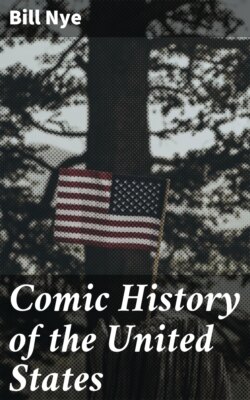Читать книгу Comic History of the United States - Nye Bill - Страница 12
На сайте Литреса книга снята с продажи.
ОглавлениеNEGROES STILL HAVE FAMILIES.
After the death of Powhatan, the friend of the English, an organized attempt was made by the Indians to exterminate the white people and charge more for water frontage the next time any colonists came.
PREPARING THE FEAST.
March 22, 1622, was the day set, and many of the Indians were eating at the tables of those they had sworn to kill. It was a solemn moment. The surprise was to take place between the cold beans and the chili sauce.
But a converted Indian told quite a number, and as the cold beans were passed, the effect of some arsenic that had been eaten with the slim-neck clams began to be seen, and before the beans had gone half-way round the board the children of the forest were seen to excuse themselves, and thus avoid dying in the house.
Yet there were over three hundred and fifty white people massacred, and there followed another, reducing the colonists from four thousand to two thousand five hundred, then a massacre of five hundred, and so on, a sickening record of death and horror, even worse, before a great nation could get a foothold in this wild and savage land; even a toe-hold, as I may say, in the sands of time.
July 30, 1619, the first sprout of Freedom poked its head from the soil of Jamestown when Governor Yeardley stated that the colony "should have a handle in governing itself." He then called at Jamestown the first legislative body ever assembled in America; most of the members whereof boarded at the Planters' House during the session. (For sample of legislator see picture.) This body could pass laws, but they must be ratified by the company in England. The orders from London were not binding unless ratified by this Colonial Assembly.
This was a mutual arrangement reminding one of the fearful yet mutual apprehension spoken of by the poet when he says—
"Jim Darling didn't know but his father was dead,
And his father didn't know but Jim Darling was dead."
The colony now began to prosper; men held their lands in severalty, and taxes were low. The railroad had not then brought in new styles in clothing and made people unhappy by creating jealousy.
Settlements joined each other along the James for one hundred and forty miles, and the colonists first demonstrated how easily they could get along without the New York papers.
Tobacco began to be a very valuable crop, and at one time even the streets were used for its cultivation. Tobacco now proceeded to become a curse to the civilized world.
JAMESTOWN LEGISLATOR.
In 1624, King James, fearing that the infant colony would go Democratic, appointed a rump governor.
The oppression of the English parliament now began to be felt. The colonists were obliged to ship their products to England and to use only English vessels. The Assembly, largely royalists, refused to go out when their terms of office expired, paid themselves at the rate of about thirty-six dollars per day as money is now, and, in fact, acted like members of the Legislature generally.
In 1676, one hundred years before the Colonies declared themselves free and independent, a rebellion, under the management of a bright young attorney named Bacon, visited Jamestown and burned the American metropolis, after which Governor Berkeley was driven out. Bacon died just as his rebellion was beginning to pay, and the people dispersed. Berkeley then took control, and killed so many rebels that Mrs. Berkeley had to do her own work, and Berkeley, who had no one left to help him but his friends, had to stack his own grain that fall and do the chores at the barn.
Jamestown is now no more. It was succeeded in 1885 by Jamestown, North Dakota, now called Jimtown, a prosperous place in the rich farming-lands of that State.
Jamestown the first, the scene of so many sorrows and little jealousies, so many midnight Indian attacks and bilious attacks by day, became a solemn ruin, and a few shattered tombstones, over which the jimson-weed and the wild vines clamber, show to the curious traveller the place where civilization first sought to establish itself on the James River, U.S.A.
The author wishes to refer with great gratitude to information contained in the foregoing chapter and obtained from the following works:
The Indian and other Animalcula. By N. K. Boswell, Laramie City, Wyoming.
How to Jolly the Red Man out of his Lands. By Ernest Smith.
The Female Red Man and her Pure Life. By Johnson Sides, Reno, Nevada (P.M. please forward if out on war-path).
The Crow Indian and His Caws. By Me.
Massacre Etiquette. By Wad. McSwalloper, 82 McDougall St., New York.
Where is my Indian to night? By a half-bred lady of Winnipeg.
